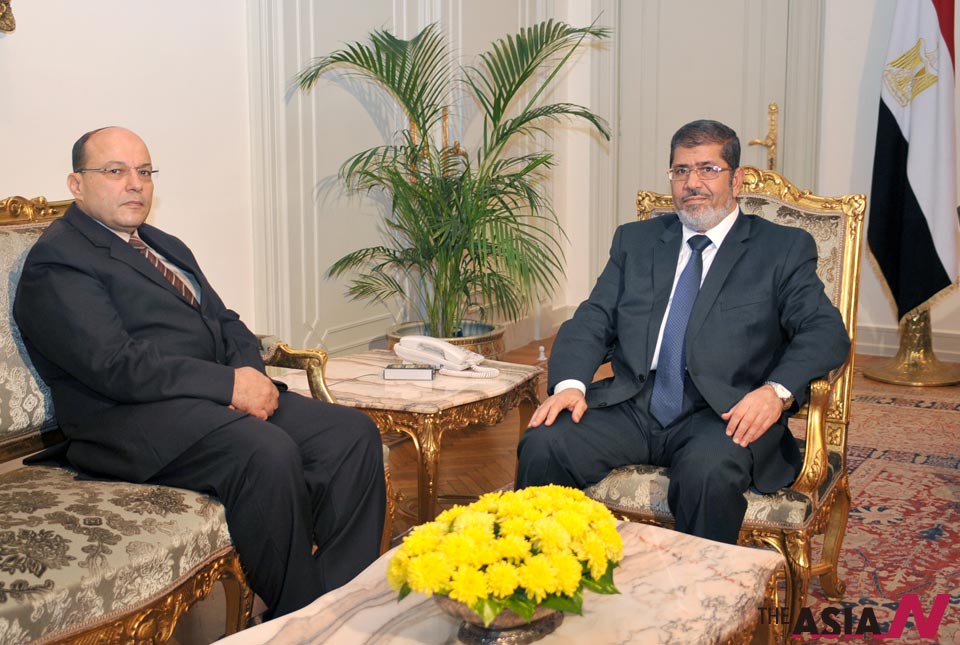
Egyptian journalists challenge constitutional declaration by President Morsi
The general assembly of the Egyptian Journalists Syndicate on Sunday voiced its rejection of President Mohamed Morsi’s constitutional declaration, threatening to stage a general strike in retaliation for Morsi’s divisive Thursday declaration.
Eight decisions are adopted by the General Assembly:
First:
The emergency general assembly of the Journalists Syndicate declares its full rejection of the recent decisions issued by the President of the Republic under the name of “constitutional declaration”. This declaration has a blatant assault on civil liberties, the rule of law and the independence of the judiciary. It also restricts the media in all its forms. Assembly warns of risks that threaten the cohesion of the nation and the objectives of the glorious revolution of January 25 if these decisions are not immediately retracted.
Second:
The Assembly endorsed the resolution of withdrawal taken by Journalists Union Council from the Constituent Assembly to put the constitution after squandering texts proposed by the Press Syndicate and the Supreme Press Council, and authorizes the General Council of the Bar to take every escalatory steps necessary in the event of not paying any attention to the group’s demands, and the scheduling of the general strike and blocked the newspapers, and other procedures. The Assembly stresses that the Constitution should include the basic guarantees of freedom of the press, made by the journalists’ union, and the most important:
• prohibits any way of censoring newspapers and the media, confiscated or warning, suspension or cancellation.
• It is not permissible to charge in publishing crimes without a judgment taken by direct prosecution, do not expect a penalty of deprivation of liberty in these crimes.
• independence of newspapers and national media that all state-owned authorities, to be free of political parties, and be an arena for national dialogue between all opinions and trends and an end to the tutelage of the Shura Council (Shura is a council of consultants chosen by the governing party and has the authority to rule the media) and the Ministry of Information on the national newspapers and television and public sectors.
• It is clear to announce the independence of journalists’ union and other labor unions of any interventions by the executive authority affect the performance of its mission in the service of its members and the community, and rejected the text contained in the draft constitution currently allows for the first time to dissolve unions, and stresses the Assembly that the masses of journalists will defend vigorously for independence ancient union and other unions.
Third:
Adoption of a regulation to pay journalists, ensure raise minimum comprehensive salary to three thousand pounds ($500), and the adoption of a maximum of comprehensive income in the institutions of national press no more than 15 times the minimum income, affirmation of the right of journalists to income more respectful and more equitable distribution of access in different journalistic institutions, in accordance with the principles and mechanisms described in detail in the project by the Assembly in this regard.
Fourth:
Assembly stresses need the commitment of all institutions national press decisions assemblies prior to the journalists’ union to have the tide and mandatory for all journalists to 65 years, with no pay for any of executive positions of leadership for those who exceeded the age of sixty. The Assembly authorizes the General Council to take disciplinary action toward anyone who violates this decision among the leaders of national press institutions or the Supreme Council of the Press, and submit a report thereon to the General Assembly.
Fifth:
Assembly stresses the need to respect the previous resolutions of the general assembly of the union of journalists, as Journalists Syndicate’s commitment not to take administrative action or a journalist higher than the position he occupied when he was elected, and if they did not resign voluntarily, withdraw confidence journalists automatically once accepted the job, and the Assembly meets to elect another head of the office.
Sixth:
Assembly instructs the Board of journalists’ union to call a general conference, told reporters later than the end of December 2012 to find out what faces the journalism profession of risk and to consider legislation and general conditions that govern it, and reform institutional structures national press to ensure performance efficiently responsibilities entrusted with the development of resources and protection workers’ rights, and organization of the rules governing the work of party newspapers and private and independent to ensure the rights of workers.
Seventh:
Assembly decides out a peaceful march immediately after its heading to Tahrir Square to announce the group’s refusal of journalistic decisions taken by the President of the Republic, which represents a wasting of freedoms and the rule of law and establish a dictatorial rule. The Assembly also decided to gather in its quarters on Tuesday and starting a peaceful march with the rest of national forces.
Eighth:
The Assembly decided to be in permanent session to follow the developments of the current dangerous situation. The Assembly holds all journalists demands of liberalization of the press and media from the dominance of the executive branch and other authorities and the text explicitly in the Constitution, and a willingness to practice all forms of struggle for democracy to defend these demands. The dialogue and negotiation with relevant bodies will be on the basis of the protection of public freedoms in the heart of freedom of the press, while ensuring a decent life for the masses of journalists to enable them to perform their mission in the service of their country and their fellow citizens.








